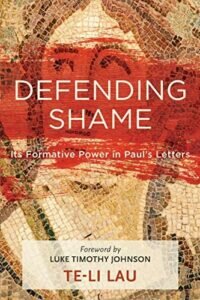In the kitchen one night, I explained a little about the book I had been reading on shame and asked my family what they thought. My adult children, in their forties and all Christians, protested strongly that there was nothing good about shame and wanted to find another name for it that did not trigger such strong negative connotations. Brené Brown’s podcasts and psychological research were mentioned. After listening for a while, my grandson, age thirteen, sat in the middle of us all and explained in an impressively articulate manner how he experienced shame, and that some shame was a good thing in keeping him from doing wrong things. He did not see it as a totally bad feeling. It did not make him feel like a worthless and unlovable person.
For some years, I have given lectures on shame and guilt and, like my grandson, have come to be convinced from Scripture and from experience that some shame is healthy and much unhealthy and even toxic. It seems that the current mid-generation have been so affected by the psychological culture that they tend to shame (perhaps unintentionally!) anyone who believes that shame can be a good thing! As Lau writes, that psychological culture’s current spokesperson is Brene Brown, resting on the research she quotes by Tangey and DearingJune Price Tangney and Ronda L. Dearing, Shame and Guilt (New York: The Guilford Press, 2002). which found that: “There is nothing positive about shame. In any form, in any context and through any delivery system, shame is destructive. The idea that there are two types, healthy shame and toxic shame, did not bear out in any of my research.”Brene Brown, I Thought It Was Just Me (New York: Avery, 2007), 62. Cf. Lau p. 230. And in her famous TED talk, “Listening to Shame,” she says:
Shame is this web of unobtainable, conflicting, competing expectations about who we are supposed to be. It is this gremlin living inside us that repeatedly plays two thoughts in our mind: “Never good enough” or “Who do you think you are?” As a result of this feeling of inadequacy, shame drives us towards destructive patterns of behavior—highly correlated with addiction, depression, violence, aggression, bullying, suicide, eating disorders.
Professor Te-Li Lau has described the debates and conflicts over shame and guilt with profound wisdom and careful biblical scholarship. I find myself in agreement with almost everything he has written. However, there are several areas that I would like to reflect on a little more.
In my psychotherapy practice, I listen to many stories of men and women carrying burdens of very unhealthy shame from dysfunctional family relations and/or abuse.In my psychotherapy practice, I listen to many stories of men and women carrying burdens of very unhealthy shame from dysfunctional family relations and/or abuse. Sadly, in the church too, we know of examples of Christians being painfully shamed by gifted but flawed church leaders, particularly in the recent “Rise and Fall of Mars Hill.” In social media, we see extreme examples of public shaming.
On the other hand, many Christians see Lau’s suggestion that God himself, the prophets in the Old Testament, and the Apostle Paul, used shame in a healthy way and that we should be learning to do the same in the church today, as damaging and dangerous. And even though I find Lau’s thesis very plausible, I do wonder if he is making allowances for the cultural differences and the acceptability of shame in secular Graeco-Roman day to day life so that, in our day, we may have to apply the use of shame in discipling and church discipline in a more gentle and nuanced manner than Paul did. Lau is certainly very careful on the final page of the book to describe healthy constructive shaming with excellent safeguards.
In the 1980s and 1990s it was accepted that shame has a creative and positive value in helping us to develop healthy self-awareness and relationships and it can be a guideline for living. Ronald and Patricia Potter-Efron’s book Letting Go of Shame has an early chapter on “When Shame is Good.”Ronald and Patricia Potter-Efron, Letting Go of Shame: Understanding How Shame Affects Your Life (Center City, MN: Hazelden, 1989). Most of the book is an analysis of the many sources of shame and how the wounds from bad shame can be healed. Lewis Smedes in Shame and Grace: Healing the Shame We Don’t Deserve and Stephen Pattison in Shame: Theory, Therapy, Theology also suggest that shame has a positive side.Lewis Smedes, Shame and Grace: Healing the Shame We Don’t Deserve (San Francisco, CA: HarperSanFrancisco, 1993); Stephen Pattison, Shame: Theory, Therapy, Theology (Cambridge: Cambridge University Press, 2000), 23. Tangney and Dearing’s research was published in 2002, and their definitions of guilt and shame have been the basis of the extensive research on these emotions in the last twenty years. Ever since then, most psychologists have focused on the damage that the corrosive power of shame can do, and have suggested that we should do all we can to get rid of, or at least rise above, shame. Guilt, they say, is a healthier emotion because it focuses on an action that I have done (external focus), whereas shame focuses on who I am as a person (internal focus). Feeling bad about oneself (never good enough, unworthy of acceptance and belonging, etc.) hinders empathy and a clear view of the situation that has caused the shame.
In her thoughtful paper on shame, guilt and repentance, Mary Vanden Berg points out that theologians such as Bavinck, Hoekema, Erickson, Oden, Plantinga, and others tend to either ignore discussions of shame or make little distinction between shame and guilt.Mary Vanden Berg, “Shame, Guilt and the Practice of Repentance: An Intersection of Modern Psychology with the Wisdom of Calvin,” Christian Scholars Review, Spring, L:3 (2021). See especially footnotes 2, 4, and 5.
She then writes:
In contrast to theology, psychological research dealing with the effects of shame on human relationships has proliferated over the past 30 years. In her recent book Daring Greatly, Dr. Bréné Brown brought the insights gained from this empirical research to a popular audience. Daring Greatly reached the number one position on the New York Times best seller list. Her work clearly struck a chord with many readers. The psychological research on which Brown’s book is based has not only offered a helpful understanding of the distinction between guilt and shame but has also demonstrated empirically the toxicity of shame on interpersonal relationships. By contrast, in some of the same studies, guilt turns out to have relatively positive effects in one’s life and relationships. Guilt it seems, at least in part, is good for you.
While Vanden Berg acknowledges (in a footnote) that she is a philosopher and not a psychologist and that some psychologists have a different view of shame and guilt, she accepts the conclusions of the empirical research without criticism. But I wonder if the clear divide between shame and guilt described by Smedes, and by Tangney and Dearing, and on which the last 30 years of research has been based, has led to some false conclusions.
In fact, Vanden Berg acknowledges some of the difficulties in the definitions:
Interestingly, Tangney and Dearing note that moral emotions have been difficult to study quantitatively in part because of the difficulty of distinguishing one moral emotion from another. This problem has made measurement of these emotions in “consistent, theoretically meaningful ways” challenging. Nonetheless, they write that recently researchers have met this challenge, and that there is “now emerging a ‘critical mass’ of scientifically based knowledge pertaining to the emotions of shame and guilt.”See Tangney and Dearing, Shame and Guilt, 3, 11.
Vanden Berg appears to accept these conclusions without any problem. But I wonder if we need to go back and look at Tangney and Dearing’s early assumptions about shame and guilt to see how much they match a biblical perspective of these important moral emotions. Scientific research is often affected by the presuppositions of the research team and their bias in collecting data, and is not always as reliable as we hope.See Joseph P. Simmons, Leif D. Nelson, and Uri Simonshon, “False-Positive Psychology: Undisclosed Flexibility in Data Collection and Analysis Allows Presenting Anything As Significant,” Psychological Science, Volume 22, Issue 11 (2011): 1359–366; Harold Pashler and Eric-Jan Wagenmakers, “Editors’ Introduction to the Special Section on Replicability in Psychological Science: A Crisis of Confidence?,” Perspectives on Psychological Science, Volume 7, Issue 6 (2012): 528–30.
Helpfully summarizing some aspects of the research, Vanden Berg writes:
Tangney and Dearing found that shame and guilt share the locus of being internal attributions. In both shame and guilt the person will recognize her responsibility for the morally impermissible action. However, shame and guilt diverge in the other two categories. Shame is a global attribution, attributing the negative behavior or moral failure to the whole person rather than recognizing that this failure is only one particular failure and not characteristic of who the person is as a whole. Hartling, Rosen, Walker, and Jordan write that “The [psychological] literature recognizes shame as an intense, enduring experience that affects the whole self.” In addition, shame is a stable attribution, suggesting that regardless of the circumstances or causes of this particular failure, the person involved is the sort of person who will fail regardless of those circumstances. With respect to our example, the person experiencing shame will be convinced that there are no mitigating circumstances. Her behavior is reflective of her general character.See Linda Hartling, Wendy Rosen, Maureen Walker, and Judith Jordan, “Shame and Humiliation: From Isolation to Relational Transformation,” Work in Progress 88 (Wellesley Centers for Women, Wellesley College, 2000): 1.
I wonder if shame has to be seen as so all embracing. Do we not at times feel shame about some aspect of our character rather than about our whole person? Does shame always carry the feeling of being totally worthless and useless and deserving rejection? Pattison writes that the shamed person sees herself as being “judged to be inferior, defective, incompetent, undesirable, or unlovable.”Pattison, Shame. With unhealthy shame it does, but perhaps with healthy shame it can be more nuanced and partial, so that shame is felt in various degrees of intensity of self-criticism.
If I steal from you or abuse you in some way, I should feel guilty, but I also feel ashamed that I am capable of doing such things—if my conscience is functioning well. I still suffer the remnants of sin even while my true identity is in Christ. I am not fundamentally a thief or abuser. The modern view would be to say that I should feel guilty for what I have done but should not say I am a bad person or a thief or an abuser. The latter is shame speaking. And shame, they say, only I wonder if shame has to be seen as so all embracing. Do we not at times feel shame about some aspect of our character rather than about our whole person?leads to bad consequences, whereas guilt leads to remorse for the effect on others, repentance, and a desire to reform and make amends. But I think Pauline shame includes aspects of both guilt and shame. As Lau writes, “Pauline ethics teaches us that it is a mistake to divide deed and identity sharply.” Guilt needs shame, because it “fails to underscore the gravity of sin” and “treats only the symptoms . . . guilt is sufficient if we narrowly focus on moral responsibility and blame. Shame, however, is needed if we extend the focus toward the moral character and values” (pp. 213–14).
Shame and guilt are the moral emotions and thoughts of conscience. After the fall, Adam and Eve, and we, experience both as we fall short of what we are made for. If raised in a Christian family and church with good values and strong relationships, then shame and guilt work as they were intended to, without too many distortions. But since we live in a fallen world, most of us come from families and churches that are less than perfect, and even badly dysfunctional. We are therefore prone to experience the distortions of true and false guilt and true and false shame. Guilt is indeed about what I have done and shame is about who I am, but we cannot separate these two moral emotions and get rid of shame entirely. We have to learn to respond appropriately to both as they interweave with each other.
Guilt is indeed about what I have done and shame is about who I am, but we cannot separate these two moral emotions and get rid of shame entirely.
At a deeper level, could the current movement to get rid of shame be a result of our cultural rejection of God-given objective moral values and replacing them with our own individual values or accepting the values of our subcultural group? Creating our own individual morality gets rid of guilt and shame as I am then only responsible to myself. Accepting the morality of our subcultural group (family, church, political party, etc.) may leave us with some shame for not living up to the values of those with whom we associate. We have moved towards a highly individualistic culture, but perhaps are now moving back towards a collectivist/community culture again—finding our identity and value in relation to our subcultural group without reference to any absolute moral values. We seem to oscillate between the two. Perhaps we have become an honor/shame culture like many cultures around the world. It used to be said that the US and Western Europe were guilt cultures, because they rested on a Christian sense of right and wrong and sadly, minimal attention was paid to shame. Now, for the non-Christian there is every incentive to feel good without God, so any shame is defined as bad because it defines you as a bad person. The remedy is to have self-compassion, believe that you are OK just as you are, and ignore any shame you may feel in relation to those around you.
As Christians, we know that we are sinners and not the way God wants us to be (always falling short), but can trust that God loves, forgives, and is transforming us even though we may feel some shame until the day we die. We may recognize a positive and healthy role for shame but also see that the majority of shame arises because we live with the wrong value systems and also are often sinned against by others in ways that are very damaging and shaming. We carry a load of shame through no fault of our own. There are thankfully a number of shame reduction/resilience strategies/therapies that can go a long way to helping to reduce the load of toxic shame in people’s hearts and minds. We can see these as common grace remedies for a fallen world. But ultimately, guilt is healed by forgiveness and shame by acceptance. For the Christian, these come together at the cross where our sins/shortcomings are forgiven and our shame begins to be healed in the acceptance of a loving God. For the non-Christian and Christian alike, there can be forgiveness between people and acceptance that begins to heal shame. Shame is dissolved over time in the context of both self-compassion and acceptance from others before whom we have felt shamed.





Comments
Be the first one to make a comment!